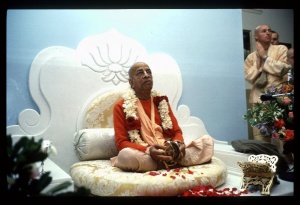CC Adi 12.18 (1975): Difference between revisions
(Vanibot #0027: CCMirror - Mirror CC's 1996 edition to form a basis for 1975) |
(Vanibot #0020: VersionCompareLinker - added a link to the Version Compare feature) |
||
| Line 2: | Line 2: | ||
<div style="float:left">'''[[Sri Caitanya-caritamrta (1975)|Śrī Caitanya-caritāmṛta (1975)]] - [[CC Adi (1975)|Ādi-līlā]] - [[CC Adi 12 (1975)|Chapter 12: The Expansions of Advaita Acārya and Gadādhara Paṇḍita]]'''</div> | <div style="float:left">'''[[Sri Caitanya-caritamrta (1975)|Śrī Caitanya-caritāmṛta (1975)]] - [[CC Adi (1975)|Ādi-līlā]] - [[CC Adi 12 (1975)|Chapter 12: The Expansions of Advaita Acārya and Gadādhara Paṇḍita]]'''</div> | ||
<div style="float:right">[[File:Go-previous.png|link=CC Adi 12.17 (1975)|Ādi-līlā 12.17]] '''[[CC Adi 12.17 (1975)|Ādi-līlā 12.17]] - [[CC Adi 12.19 (1975)|Ādi-līlā 12.19]]''' [[File:Go-next.png|link=CC Adi 12.19 (1975)|Ādi-līlā 12.19]]</div> | <div style="float:right">[[File:Go-previous.png|link=CC Adi 12.17 (1975)|Ādi-līlā 12.17]] '''[[CC Adi 12.17 (1975)|Ādi-līlā 12.17]] - [[CC Adi 12.19 (1975)|Ādi-līlā 12.19]]''' [[File:Go-next.png|link=CC Adi 12.19 (1975)|Ādi-līlā 12.19]]</div> | ||
{{CompareVersions|CC|Adi 12.18|CC 1975|CC 1996}} | |||
{{RandomImage}} | {{RandomImage}} | ||
==== TEXT 18 ==== | ==== TEXT 18 ==== | ||
| Line 18: | Line 17: | ||
<div class="synonyms"> | <div class="synonyms"> | ||
kṛṣṇa- | kṛṣṇa-miśra—of the name Kṛṣṇa Miśra; nāma—name; āra—and; ācārya-tanaya—the son of Advaita Ācārya; caitanya-gosāñi—Lord Caitanya Mahāprabhu; baise—sits; yāṅhāra—in whose; hṛdaya—heart. | ||
</div> | </div> | ||
| Line 29: | Line 28: | ||
= | <div class="purport"> | ||
</div> | </div> | ||
Latest revision as of 14:40, 26 January 2020
Śrī Caitanya-caritāmṛta (1975) - Ādi-līlā - Chapter 12: The Expansions of Advaita Acārya and Gadādhara Paṇḍita

His Divine Grace
A.C. Bhaktivedanta Swami Prabhupada
A.C. Bhaktivedanta Swami Prabhupada
TEXT 18
- kṛṣṇa-miśra-nāma āra ācārya-tanaya
- caitanya-gosāñi baise yāṅhāra hṛdaya
SYNONYMS
kṛṣṇa-miśra—of the name Kṛṣṇa Miśra; nāma—name; āra—and; ācārya-tanaya—the son of Advaita Ācārya; caitanya-gosāñi—Lord Caitanya Mahāprabhu; baise—sits; yāṅhāra—in whose; hṛdaya—heart.
TRANSLATION
Kṛṣṇa Miśra was a son of Advaita Ācārya. Lord Caitanya Mahāprabhu always sat in his heart.